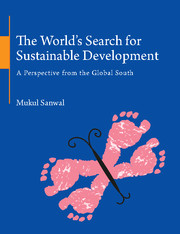Book contents
- Frontmatter
- Dedication
- Contents
- Preface
- Acknowledgments
- Abbreviations
- INTRODUCTION
- 1 Social Dimension of Sustainability
- CONSUMPTION IN AN UNEQUAL WORLD: FRAMING INTERNATIONAL COOPERATION
- CLIMATE POLICY: GLOBAL TO NATIONAL
- 6 Political Origins of Climate Policy
- 7 Questions on the Framework
- 8 Burden Shifting Rather than Burden Sharing
- 9 Development of a Shared Vision
- 10 The Middle Class and Global Ecological Limits
- 11 The New Climate Regime
- SUSTAINABLE DEVELOPMENT: NATIONAL TO GLOBAL
- CONSUMPTION IN A MORE EQUAL WORLD: SHAPING SOCIETAL FUNCTIONS
- GEOPOLITICS TO GEOECONOMICS: RURAL–URBAN DIVIDE, RATHER THAN BETWEEN COUNTRIES
- THE ASIAN CENTURY
- Index
8 - Burden Shifting Rather than Burden Sharing
from CLIMATE POLICY: GLOBAL TO NATIONAL
Published online by Cambridge University Press: 18 December 2015
- Frontmatter
- Dedication
- Contents
- Preface
- Acknowledgments
- Abbreviations
- INTRODUCTION
- 1 Social Dimension of Sustainability
- CONSUMPTION IN AN UNEQUAL WORLD: FRAMING INTERNATIONAL COOPERATION
- CLIMATE POLICY: GLOBAL TO NATIONAL
- 6 Political Origins of Climate Policy
- 7 Questions on the Framework
- 8 Burden Shifting Rather than Burden Sharing
- 9 Development of a Shared Vision
- 10 The Middle Class and Global Ecological Limits
- 11 The New Climate Regime
- SUSTAINABLE DEVELOPMENT: NATIONAL TO GLOBAL
- CONSUMPTION IN A MORE EQUAL WORLD: SHAPING SOCIETAL FUNCTIONS
- GEOPOLITICS TO GEOECONOMICS: RURAL–URBAN DIVIDE, RATHER THAN BETWEEN COUNTRIES
- THE ASIAN CENTURY
- Index
Summary
Changing scope of the negotiations
Actions in developing countries, rather than emissions reductions limited to industrialized countries, soon became the central issue in the climate negotiations. Having secured a broad agreement on limiting increase in global temperature to 2°C, industrialized countries began insisting on a global goal of halving emission levels by 2050, which continues to focus on future flows rather than historical stocks of carbon, even though science dictates that concentration and not emissions of greenhouse gases (GHGs) causes increase in global temperature and that, too, over a long period of time. A doubling of the atmospheric concentration of carbon dioxide corresponds to global warming of 2.3–4.5°C within the 68 per cent confidence interval, but only by 2150. The causes of the melting of the Greenland Ice Shield as well as West Antarctic Ice Shield, each containing enough ice to raise the global sea-level by around 5 m, are also not clear as sea levels have risen some 7 m in pre-historic times from the sun's energy because of the orbital oscillations of the earth. As industrialized countries continue to set the agenda, these scientific findings and uncertainties have been disregarded in the negotiations; they would allow an over-shooting of emissions in developing countries, to allow for the rural poor to move into the urban middle class, before declining assisted by aging populations.
The Convention requires as an ‘aim’ that industrialized country emissions should have peaked at 1990 levels by the year 2000 – modified longer term trends. As industrialized country emissions have continued to grow, developing countries see the global goal, with its implications for a peaking year, as a threat to their future economic growth and an effort to alter the agreed balance of rights and obligations in the climate treaty.
This approach, even if controversial principles and provisions of the Convention related to equity are not taken into account, will shift the burden to developing countries. First, it is argued that since emissions from developing countries will account for half of the global emissions by 2050, they must take on emission reduction commitments now.
- Type
- Chapter
- Information
- The World's Search for Sustainable DevelopmentA Perspective from the Global South, pp. 131 - 139Publisher: Cambridge University PressPrint publication year: 2015

